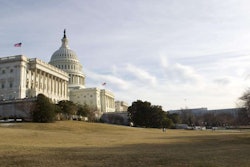
The American Trucking Associations on Thursday, June 28, saluted members of the House and Senate conference committee for their work in passing what the group describes as “a safety-conscious highway bill that lays a solid foundation for addressing America’s need for an efficient goods movement network.”
“This legislation, while not all we could have hoped for as an industry and as users of the highway system, makes tremendous strides in the safety arena and puts down a marker for future improvements to our nation’s freight infrastructure,” said Bill Graves, ATA president and chief executive officer, thanking the committee for “putting partisanship aside and putting together a compromise bill that will benefit not just the trucking industry, but highway safety and the economy as a whole.”
House and Senate committee conferees agreed to maintain current federal transportation levels for 27 months, and Senate aides worked Wednesday, June 27, to put the agreement into legislative language.The current three-month highway bill extension, set to expire Saturday, June 30, is the ninth since the September 2009 expiration of SAFETEA-LU, the most recent long-term transportation funding law.
Graves said ATA and its members urged Congress to pass the legislation. He praised the committee’s inclusion of several initiatives advocated by the group, including:
• A mandate for electronic logging devices;
• The creation of a clearinghouse to track drug and alcohol test results;
• A study of crashworthiness standards for large trucks;
• The establishment of standards for systems to provide employers with timely notifications of drivers’ moving violations; and
• Mandatory testing of new carriers entering the industry to verify their knowledge of safety requirements.
“The conferees have set our industry on the path to even greater improvements in safety by requiring the Department of Transportation to mandate that truck drivers use electronic devices to record their compliance with the hours-of-service requirements,” Graves said. “This is a tremendous leap forward for trucking, which will bring our compliance systems into the 21st century, leveling the playing field for our industry and lead to even fewer crashes on our nation’s highways.”
The bill also requires DOT to conduct a field study of the Federal Motor Carrier Safety Administration’s pending changes to the restart provisions in the hours-of-service regulations; ATA has pressed DOT to confirm their benefits in a “real-world” field study before implementing the pending changes.
The bill also lays a foundation for improvements in freight transportation – albeit without increases in funding. “ATA has long supported increasing user fees, specifically the diesel tax, to fund overdue repair and expansion of our highway system,” said ATA Chairman Dan England, chairman of C.R. England of Salt Lake City. “While this bill does not do that, it does make impressive reforms to the planning process which will reduce costs and speed construction projects, including making freight transportation a greater priority, along with providing certain enticements for states to fund freight projects.”
England said that as the current bill’s reforms take effect, Congress should draft additional legislation that provides additional funding to maintain and grow the nation’s infrastructure network and dedicates funds to the movement of freight.
Graves added, however, that ATA was “extremely disappointed” that Congress “once again kicked the can down the road” with respect to truck productivity by not including increases in truck size and weight limits that would “have a net positive effect on highway safety and maintenance.”
Graves also dismissed the House’s approval of an amendment offered by Rep. Jeff Landry (R-La.) to prevent DOT from going forward with the electronic logging device mandate. “Adoption of this amendment is a step back,” he said. “Though opponents of honest, fair and efficient enforcement of important safety rules have used this back door to thwart the will of Congress, we fully expect that the language of the conference report – agreed to by House and Senate leaders of both parties – will be the final word on the use of electronic logs and that DOT will quickly move to require this important safety technology on all trucks.”












